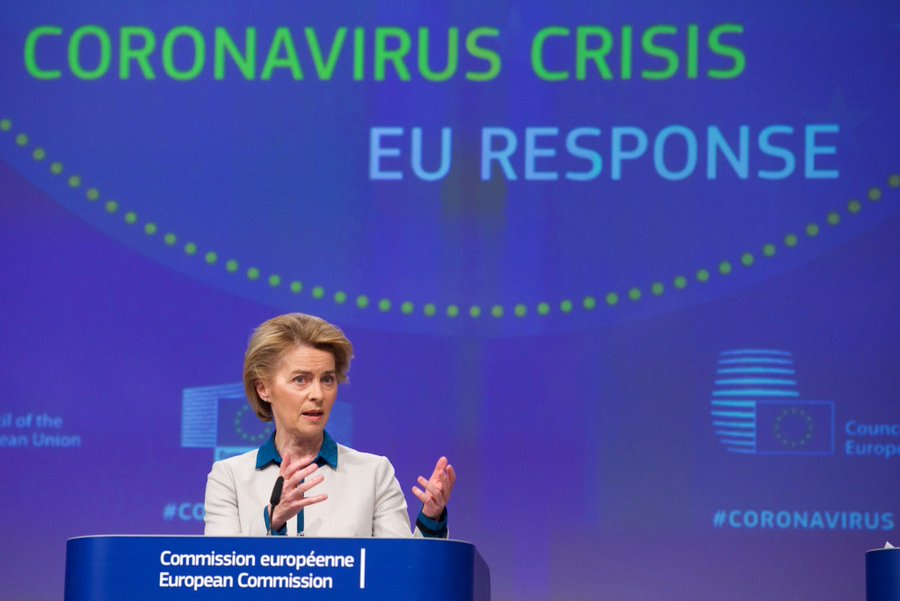The European Commission has today published the first EU-wide report on the rule of law. Today’s report includes input from every Member State and covers both positive and negative developments across the EU. It shows that many Member States have high rule of law standards, but important challenges to the rule of law exist in the EU. It also reflects relevant developments stemming from the emergency measures taken by Member States due to the coronavirus crisis. The report covers four main pillars with a strong bearing on the rule of law: national justice systems, anti-corruption frameworks, media pluralism and freedom, and other institutional issues related to the checks and balances essential to an effective system of democratic governance.
The aim of the new Rule of Law Report is to enlarge the existing EU toolbox with a new preventive tool and kick-start an inclusive debate and rule of law culture across the EU. It should help all Member States examine how challenges can be addressed, how they can learn from each other’s experiences, and show how the rule of law can be further strengthened in full respect of national constitutional systems and traditions.
European Commission President Ursula von der Leyen said: “The rule of law and our shared values are the foundation of our societies. They are part of our common identity as Europeans. The rule of law protects people from the rule of the powerful. While we have very high rule of law standards in the EU, we also have various challenges. The European Commission will continue working with the national authorities to find solutions, to guarantee people’s everyday rights and freedoms.”
Vice-President for Values and Transparency, Věra Jourová, said: “Today we are filling an important gap in our rule of law toolbox. The new report for the first time looks at all Member States equally to identify rule of law trends and help to prevent serious problems from arising. Each citizen deserves to have access to independent judges, to benefit from free and pluralistic media and to trust that their fundamental rights are respected. Only then, can we call ourselves a true Union of democracies.”
Commissioner for Justice and Consumers, Didier Reynders, said: “The new Rule of Law Report is the start of an open and regular dialogue with every Member State, a way in which we can share good practices and pre-empt challenges before they become entrenched. The goal is to instil a real rule of law culture across the European Union, and trigger a genuine debate at national and EU level.”
Key findings on the rule of law situation in Member States
- Justice systems
A number of Member States are undertaking reforms to strengthen judicial independence and are reducing the influence of the executive or legislative power over the judiciary. This includes Member States where judicial independence has traditionally been seen as high or even very high. The country specific assessments show that judicial independence remains an issue of concern in some Member States, some of which have led to infringements or Article 7(1) proceedings. Ensuring justice systems are fit for the digital age is also an EU-wide challenge and the current pandemic has provided additional impetus to accelerate necessary digital reforms.
- Anti-corruption frameworks
Several Member States have adopted comprehensive anti-corruption strategies, while others are in the process of preparing such strategies. Effective implementation and monitoring remain key to ensure progress. Many Member States have also taken, or foresee taking, measures to strengthen their corruption prevention and integrity framework, and some Member States have adopted measures to strengthen the capacity of the criminal justice system to fight corruption. On the other hand, the effectiveness of criminal investigations, prosecution and adjudication of corruption cases, including high-level corruption, is still a challenge in several Member States.
- Media freedom and pluralism
EU citizens broadly enjoy high standards of media freedom and pluralism. Especially during the coronavirus pandemic, media have proven essential in fighting disinformation. The report nevertheless raises concerns about effectiveness and adequate resources, as well as risks of politicisation of media authorities in some Member States. Some country assessments have further identified cases where serious concerns have been raised regarding political pressure on media. Lastly, journalists and other media actors face threats and attacks in relation to their work in a number of Member States, although some countries have also developed practices and set up structures and measures to support and protect journalists.
- Institutional checks and balances
Institutional checks and balances are at the core of the rule of law, ensuring that power exercised by one state authority is subject to democratic oversight. In a number of Member States, constitutional reforms have been initiated to strengthen institutional checks and balances. Many Member States have also established systematic policies for involving stakeholders and ensuring that structural reforms are the product of a broad discussion within society. At the same time, the report shows that excessive use of accelerated and emergency legislation can give rise to rule of law concerns. Across the EU, civil society continues to be a key actor in defending the rule of law, and in most Member States, there is an enabling and supporting environment for civil society. However, there are examples of civil society facing serious challenges in some Member States as a result of legislation limiting access to foreign funding or smear campaigns.
Emergency measures taken in the coronavirus context
The pandemic is still ongoing and emergency regimes or emergency measures are still in place in a number of Member States. The report points to some of the issues that have arisen in the national debates and the legal and political response to the crisis. For example, changing or suspending customary national checks and balances can pose particular challenges to the rule of law. At the same time, there are several good examples of where national court rulings or the involvement of ombudspersons had a positive impact on emergency measures taken. The Commission will continue its monitoring until emergency measures are phased out.
Next steps
The Rule of Law Report will feed into the wider debate on the rule of law at the European and national levels. The Commission looks forward to engaging with the European Parliament and the Council on rule of law issues and considers that this report provides a solid basis for further inter-institutional work.
The Commission also invites national parliaments and national authorities to discuss this report, including its country chapters, and seek support from one another as an encouragement to pursue reforms and an acceptance of European solidarity. Relevant national and EU-level stakeholders should also be involved.
Based on the outcome of the dialogue around the 2020 edition and drawing on experiences gained in the first year of the functioning of the European Rule of Law Mechanism, the Commission will start preparing the 2021 report, carrying forward the momentum to make the rule of law more resilient in our democracies.
Background
The first annual Rule of Law Report is one of the major initiatives of the Commission’s Work Programme for 2020, and part of the comprehensive European Rule of Law Mechanism announced in the Political Guidelines of President von der Leyen. It is the result of close dialogue with national authorities and stakeholders, and covers all Member States on an objective and impartial basis. The qualitative assessment carried out by the Commission focuses on significant developments since January 2019 and ensures a coherent approach by applying the same methodology to all Member States, while remaining proportionate to developments.
The report is part of the new annual rule of law cycle – the Rule of Law Mechanism. The Mechanism is a yearly cycle to promote the rule of law and prevent problems from emerging or deepening further. The goal is to focus on improving understanding and awareness of issues and significant developments, as well as to identify rule of law challenges and help Member States find solutions with support from the Commission and the other Member States, as well as stakeholders including the Venice Commission.
The objective of the Mechanism is preventive. It is separate from the other elements in the EU’s rule of law toolbox, and does not replace the Treaty-based mechanisms for the EU to respond to more serious rule of law related issues in Member States. These tools include infringement proceedings and the procedure to protect the founding values of the Union under Article 7 of the Treaty on European Union. It is also different from the proposed budget conditionality procedure, which aims to protect the EU budget in situations where the Union’s financial interest might be at risk due to generalised deficiencies of the rule of law in a Member State.





